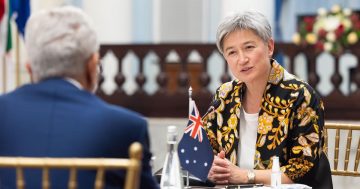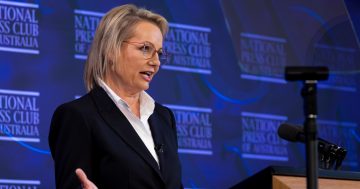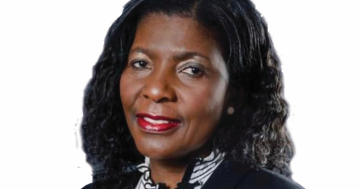Ella Syafputri Prihatini* says while Indonesia has made important strides towards gender equality in politics and its diplomatic corps, there is still significant work to be done.
 In the years since the fall of former President Suharto’s authoritarian regime – a period known as the reformasi (reform) era – women’s representation in Indonesia has increased in both the legislative and executive branches of government.
In the years since the fall of former President Suharto’s authoritarian regime – a period known as the reformasi (reform) era – women’s representation in Indonesia has increased in both the legislative and executive branches of government.
The share of female legislators increased from eight per cent in 1999 to 20.52 per cent in 2019.
Similarly, the number of female cabinet ministers has nearly tripled, growing from 5.56 per cent to 14.63 per cent between the same period.
The executive branch reached its apex of female representation in 2014, when nine out of 50 cabinet ministers were women.
Women have also recently served in key portfolios – namely finance, trade, and foreign affairs.
Many of these women came from professional backgrounds and have gained strong recognition from their peers throughout their careers for their performance.
The current speaker of the People’s Representative Council is also female, meaning Indonesia is among 41 countries with female leadership in their lower – or in some cases only – legislative chambers.
Indonesia has also made progress in its diplomatic missions.
As of the end of 2021, women comprised 9.42 per cent of all ambassadors appointed during reformasi.
This number is much improved compared to the pre-reformasi period, when women made up less than three per cent of ambassadors.
This promising progress towards gender equality has followed a series of affirmative action policies.
In politics, at least 30 per cent of Indonesia political parties’ legislative candidates must be women, in line with a gender quota that has been in place since 2009.
Gender mainstreaming policies are also shaping institutional reform in the ministry of foreign affairs, where female diplomats are encouraged to pursue their careers.
For example, the Ministry released its first gender equality in foreign policy blueprint in 2013, which was then followed by the publication of gender budgeting guidelines in 2015.
Its regulations have also been changed to allow couples to accept diplomatic assignments abroad together or to take sabbatical leave to accompany their spouses.
The fact that more women are now working as lawmakers, ministers, and ambassadors indicates that gender diversity is becoming more socially acceptable in Indonesia.
With more women attaining higher education qualifications and other key skills, the Indonesian labour market is also becoming more competitive.
However, it is crucial to note that women’s political representation in Indonesia is still a work in progress.
For some, progress has been too slow.
It’s true that the country’s movement towards gender parity in parliament has been outshone by other countries.
The average worldwide has nearly doubled from 14 per cent in 1999 to 25 per cent in 2019.
Part of the reason for this is the electoral system.
The larger house of Indonesia’s parliament, the People’s Representative Council, is elected under an open-list proportional representation system.
While voters can vote for candidates in any order, parties get to decide the order in which their candidates appear on the ballot paper.
While it is required that women appear on a ballot paper in a ‘zipper’ pattern, with one woman after at most two men, parties tend to nominate more men than women in the best positions on the ballot, and very few women are placed in the first position on the ballot paper.
As their ultimate goal is to win seats, parties will pursue what that perceive to be the most effective short-term strategy, rather than focusing on long-term goals in the interest of gender equality.
As legislative elections are prohibitively expensive, only those with strong financial and political resources or external backing can be viable candidates.
In this context, it’s important to take an intersectional approach and acknowledge that gender is not the only factor to consider.
The prevalence of dynastic parliamentarians is also critical in shaping Indonesian democracy.
Left unchecked, elites who are connected with regional heads, former and current lawmakers, and party leaders will continue to dominate leadership positions.
For instance, ministerial appointments continue to be dominated by party elites.
Despite claims by President Joko Widodo during his 2014 presidential campaign that he would not let orang partai (people affiliated with political parties) control his cabinet, seven out of his 15 combined female ministers represent ruling coalition parties.
This number is higher than any administration during reformasi.
As both ministerial and ambassadorial appointments are the president’s choice, it is very unlikely that these decisions will be made free from political considerations.
Among other factors that shape these appointments, the request from political parties to have their representatives sit in the cabinet or serve as ambassador will continue to affect professionalism and gender diversity.
Nevertheless, there are policy strategies that may help to improve women’s representation.
Aside from electoral reform, it is pivotal for Indonesia to build and nurture strategic partnerships in promoting the values of gender equality.
Professional associations could provide and recommend lists of prominent females who have excelled in their respective fields.
This peer recognition will help civil society organisations that promote women’s political activism to persuade the president to appoint more women cabinet ministers and ambassadors.
Parties should also be encouraged to openly nominate women for these positions.
Although success with this might vary across parties, the talent pool in each party should serve as an excellent starting point to make women more visible and discoverable.
Further, leaders must continue to make the case to the public that more female representation will make for a more inclusive and dynamic society.
A growing body of research has shown that female leadership offers a more diverse perspective and brings out the best possible results.
Finally, it is important for female leaders to support other women to climb the ladder through mentorship.
This will allow women to learn from each other and to ensure emerging female talent is able to break through the ‘glass ceiling’.
By undertaking institutional reforms, educating the public about the benefits of gender equality, and establishing peer-to-peer support networks, Indonesia can continue to make progress on women’s political representation.
It must do this, not just for the status of women, but for the benefit of all Indonesians.
Ella Syafputri Prihatini is a Lecturer in International Relations at Bina Nusantara University in Indonesia and an honorary research fellow at the Centre for Muslim States and Societies University of Western Australia.
This article first appeared at policyforum.net.












